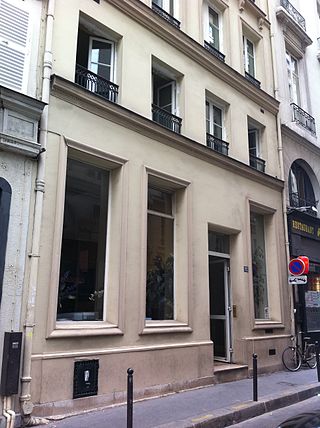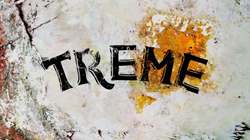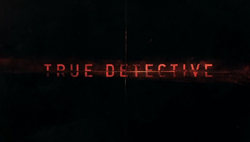
Prostitution in France was legal until April 2016, but several surrounding activities were illegal, like operating a brothel, living off the avails (pimping), and paying for sex with someone under the age of 18.

Marthe Richard was a French prostitute and spy. She later became a politician, and worked towards the closing of brothels in France in 1946.

Le Chabanais was one of the best known and most luxurious brothels in Paris, operating near the Louvre at 12 rue Chabanais from 1878 until 1946, when brothels were outlawed in France. It was founded by the Irish-born Madame Kelly, who was closely acquainted with several members at the Jockey-Club de Paris. Among the habitués were Albert, Prince of Wales ; Henri de Toulouse-Lautrec; Cary Grant; Humphrey Bogart, Mae West and diplomatic guests of the French government.
StudioCanal Limited, doing business as StudioCanal UK, is a British film distribution division and the official British branch of the French film & television production and distribution company StudioCanal in the UK. The company releases many films, including foreign, anime, independent, art, British, Irish and American films in the United Kingdom.

Treme is an American drama television series created by David Simon and Eric Overmyer that aired on HBO. The series premiered on April 11, 2010, and concluded on December 29, 2013, comprising four seasons and 36 episodes. The series features an ensemble cast including Khandi Alexander, Rob Brown, Chris Coy, Kim Dickens, India Ennenga, John Goodman, Michiel Huisman, Melissa Leo, Lucia Micarelli, David Morse, Clarke Peters, Wendell Pierce, Jon Seda, and Steve Zahn, as well as musical performances by a number of New Orleans–based artists.
AlloCiné is an entertainment website founded by Jean-David Blanc in 1988, then joined by Patrick Holzman. It has belonged to the company since 2013 Webedia. which specializes in providing information on French cinema, mostly centering on novelties' promotion with DVD, Blu-ray, and VOD information. In 2005, it began covering television series. The website is considered the "French equivalent of IMDb."

Call Me Fitz is a Canadian television series produced by E1 Entertainment, Amaze Film & Television, and Big Motion Pictures. The half-hour comedy stars Jason Priestley as Richard "Fitz" Fitzpatrick, a morally bankrupt used-car salesman whose consequence-free life is complicated by the arrival of do-gooder Larry, another salesman who claims he is Fitz's conscience.

Enlightened is an American comedy-drama television series that premiered on HBO on October 10, 2011. The series was created by Mike White, who wrote every episode, and Laura Dern. As signaled by its tagline "About a woman on the verge of a nervous breakthrough", Enlightened follows the story of Amy Jellicoe (Dern), a self-destructive executive, who, after the implosion of her professional life and a subsequent philosophical awakening in rehabilitation, tries to get her life back together.

House of Tolerance is a 2011 French drama film written and directed by Bertrand Bonello, starring Hafsia Herzi, Céline Sallette, Jasmine Trinca, Adèle Haenel, Alice Barnole, Iliana Zabeth and Noémie Lvovsky. The film had its world premiere in the Competition section of the Cannes Film Festival on 16 May 2011.
Jemima West is a French-English actress. She is bilingual and mostly grew up in Paris. She is best known for playing Isabelle Lightwood in the film adaptation of The Mortal Instruments: City of Bones and Alice Whelan in the British drama series Indian Summers. She also appeared in the second season of The Borgias as Vittoria.

The Returned is a French supernatural drama television series created by Fabrice Gobert, based on the 2004 French film They Came Back, directed by Robin Campillo. The series debuted on 26 November 2012 on Canal+ and completed its first season of eight episodes, on 17 December. In 2013, the first season won an International Emmy for Best Drama Series.

True Detective is an American anthology crime drama television series created by Nic Pizzolatto for the premium cable network HBO. The series premiered on January 12, 2014, and each season of the series is structured as a self-contained narrative, employing new cast ensembles, and following various sets of characters and settings.
Nikki Thomas is the former executive director of Sex Professionals of Canada.
Loi Marthe Richard of 13 April 1946 abolished the regime of regulated prostitution in France that had been in force since 1804. It required the closure of brothels. The law bears the name of Marthe Richard, who was a municipal councillor of Paris but not a parliamentary representative.

La Fleur blanche was a famous maison close (brothel) in the city of Paris, located at 6 rue des Moulins in the 1st Arrondissement. The property was also known as rue des Moulins and was famous for its torture room.

The Parisian Bitch, Princess of Hearts is a 2015 French hidden camera comedy film written and directed by Éloïse Lang and Noémie Saglio. It is an adaptation and a continuation of the Canal+ sketch comedy television series Connasse by Lang and Saglio.
The authorities of medieval Paris attempted to confine prostitution to a particular district. Louis IX (1226–1270) designated nine streets in the Beaubourg Quartier where it would be permitted. In the early part of the 19th century, state-controlled legal brothels started to appear in several French cities. By law, they had to be run by a woman, and their external appearance had to be discreet. The maisons were required to light a red lantern when they were open, and the prostitutes were only permitted to leave the maisons on certain days and only if accompanied by its head. By 1810, Paris alone had 180 officially approved brothels.
Prostitution in Paris, both in street form and in dedicated facilities has had a long history and remains present to this day.










